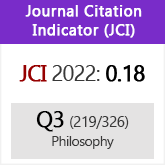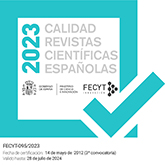Epistemic heroism and feminist consciousness. A reflection based on the cases of Christine de Pizan and Sor Juana Inés de la Cruz
DOI:
https://doi.org/10.3989/isegoria.2023.69.15Keywords:
Epistemic heroism, Feminist consciousness, Hermeneutical injustice, Christine de Pizan, Sor Juana Inés de la CruzAbstract
The aim of this work is to reflect on the incorporation of feminist consciousness into the Western imaginary on the basis of the cases of Christine de Pizan and Sor Juana Inés de la Cruz, which allow for exemplifying the concept of epistemic heroism proposed by José Medina. To this end, the critical stances of both authors are presented and the effect that they had in their respective contexts and the traces that they subsequently left are assessed. This review serves to problematize the aforementioned concept and highlights the need to historically frame it in the context of present expectations.
Downloads
References
Akkerman, Tjitske y Stuurman, Siep (1998). "Introduction. Feminism in European history". Akkerman, Tjitske and Stuurman, Siep (eds.). Perspectives on Feminist Political Thought in European History: From the Middle Ages to the Present. London/New York: Routledge, 1998.
Alatorre, Antonio (2007). Sor Juana a través de los siglos (1668-1910), 2 vols. México: El Colegio de México-El Colegio Nacional-UNAM.
Beauvoir, Simone de (2005). El segundo sexo. Madrid: Cátedra.
Benítez, Laura (1997). "Sor Juana Inés de la Cruz y la reflexión epistemológica en el Primero sueño". Filosofía y Literatura en el mundo hispánico. Salamanca: Universidad de Salamanca.
Bolufer Peruga, Mónica (2000). "Galerías de «mujeres ilustres» o el sinuoso camino de la excepción a la norma cotidiana (ss. XV-XVIII)". Hispania,60 (204), 181-224. https://doi.org/10.3989/hispania.2000.v60.i204.566
Calvo, Hortensia y Colombi, Beatriz (eds.) (2015), Cartas de Lysi. La mecenas de sor Juana Inés de la Cruz en correspondencia inédita. Madrid-Frakfurt-México: Iberoamericana-Vervuert-Bonilla Artiga Editores. https://doi.org/10.31819/9783954872268
Campoamor, Clara (1983). Sor Juana Inés de la Cruz. Gijón: Ediciones Júcar.
Colombi, Beatriz. (2022). "La Respuesta a sor Filotea de sor Juana Inés de la Cruz, la comunidad femenina y el archivo patriarcal".Recial,13(22), 116-134. https://doi.org/10.53971/2718.658x.v13.n22.39351
Ebbersmeyer, Sabrina (2020). "From a 'memorable place' to 'drops in the ocean': on the marginalization of women philosophers in German historiography of philosophy". British Journal for the History of Philosophy, 28:3, 442-462. https://doi.org/10.1080/09608788.2019.1677216
Fricker, Miranda (2016). "Epistemic Injustice and the Preservation of Ignorance". Peels, R. and Blaauw, M., (eds.). The Epistemic Dimensions of Ignorance. Cambridge: Cambridge University Press. https://doi.org/10.1017/9780511820076.010
Fricker, Miranda (2017). Injusticia epistémica. El poder y la ética del conocimiento. Barcelona: Herder.
Fricker, Miranda (2021). "Conceptos de injusticia epistémica en evolución". Las Torres de Lucca. Revista internacional de Filosofía política, 10 (19), 97-104. https://doi.org/10.5209/ltdl.76466
Glantz, Margo (2010). Obras reunidas I. Ensayos sobre literatura colonial. Madrid: Fondo de Cultura Económica, 2010.
Goetze, Trystan S. (2018). "Hermeneutical dissent and the species of hermeneutical injustice". Hypatia, 33 (1), 73-90. https://doi.org/10.1111/hypa.12384
Harding, Sandra (1991). Whose Science? Whose knowledge? Thinking from Women's Lives. New York: Cornell University Press.
Ibeas Vuelta, Nieves (2020). "Conciencia feminista, discurso literario y legitimación auctorial: Le Livre de la Cité des Dames de Christine de Pizan", Çédille, 17, 242-265. https://doi.org/10.25145/j.cedille.2020.17.13
Juana Inés de la Cruz (1976). Obras Completas, 4 vol. México: Fondo de Cultura Económico.
Juana Inés de la Cruz (2013). Primero sueño y otros escritos. México: Fondo de Cultura Económico.
Laurenzi, Elena (2009). "Christine de Pizan: ¿una feminista ante litteram?". Lectora, 15, 301-314.
Lerner, Gerda (2019). La creación de la conciencia feminista. Desde la Edad Media hasta 1870. Pamplona: Katakrak.
Medina, José (2012). "Hermeneutical Injustice and Polyphonic Contextualism: Social Silences and Shared Hermeneutical Responsibilities". Social Epistemology26 (2), 201-220. https://doi.org/10.1080/02691728.2011.652214
Medina, José (2013). The Epistemology of Resistance. Gender and racial oppression, epistemic injustice, and resistant imaginations. Oxford: Oxford University Press. https://doi.org/10.1093/acprof:oso/9780199929023.001.0001
Merrim, Stephanie (ed.) (1991). Feminist perspectives on Sor Juana Inés de la Cruz. Detroit: Wayne State University Press.
Mora, Carmen de (2021). "Década de 1910: El renacimiento de Sor Juana". Perelmuter, Rosa (ed.). La recepción literaria de sor Juana Inés de la Cruz: un siglo de apreciaciones críticas. New York: IDEA/IGAS.
Nájera, Elena (2017). "La capacidad feminista de la filosofía cartesiana". Ingenium. Revista Electrónica de Pensamiento Moderno y Metodología en Historia de la Ideas 11, 103-118. https://doi.org/10.5209/INGE.58304
Nájera, Elena (2019). "El canon filosófico y la reescritura de la exclusión femenina". Lo Sguardo. Rivista di Filosofia 29, (II), 17-34.
O'Neill, Eileen (1997). "Disappearing Ink: Early Modern Women Philosophers and Their Fate in History". Kourany, Janet A. (ed.).Philosophy in a Feminist Voice: Critiques and Reconstructions. Princeton: Princeton University Press.
O'Neill, Eileen (2019). "Introduction". O'Neill, Eileen and Lascano, Marcy P. (eds.). Feminist History of Philosophy: The Recovery and Evaluation of Women Philosophical Thought. Cham: Springer.
Paz, Octavio (1982). Sor Juana Inés de la Cruz o Las trampas de la fe. Barcelona: Seix Barral.
Pisan, Christine de; Gerson, Jean; Montreuil, Jean de; Col, Gontier y Col, Pierre (1996). Le Débat sur le Roman de la Rose. Genève: Slatkine Reprints.
Pizan, Christine de (2001). Le livre de l'Advision Cristine. Paris: Honoré Champion Éditeur.
Pizan, Christine de (2017). El camino del largo estudio. Sevilla: ArCiBel Editores.
Pizán, Cristina de (2005). La Rosa y el Príncipe. Madrid: Gredos.
Pizán, Cristina de (2013). La Ciudad de las Damas. Madrid: Siruela.
Pizán, Cristina de (2021). El Tesoro de la Ciudad de las Damas. Madrid: UNED.
Richards, Earl Jeffrey (1991). "The Medieval femme auteur as a Provocation to Literary History: Eighteenth-Century Readers of Christine de Pizan". McLeod, Glenda K (ed.), The Reception of Christine de Pizan from the fifteenth to to the nineteenth centuries, New York: The Edwin Mellen Press.
Rigaud, Rose (1911). Les idées féministes de Christine de Pizan. Neuchâtel: Université de Neuchâtel.
Schibanoff, Susan (1983). "Early women writers: in-scribing, or, reading the fine print". Women's Studies Ins. Forum, 6 (5), 475-499. https://doi.org/10.1016/0277-5395(83)90072-9
Schons, Dorothy (1925). "The first feminist in the New Word". Equal Rights, October, 31.
Torras, Meri (2003). "Soy como consiga que me imaginéis". La construcción de la subjetividad en las autobiografías epistolares de Gertrudis Gómez y sor Juana Inés de la Cruz. Cádiz: Servicio de publicaciones de la Universidad de Cádiz.
Trabulse, Elías (2021). "La rosa de Alexandría: ¿una querella secreta de sor Juana?". Inundación Castálida, 4(9), 37-41. Recuperado a partir de http://www.revistaselclaustro.mx/index.php/inundacion_castalida/article/view/670
Valle, Enid (2021). "Década de 1970: Sor Juana, «Primera Feminista de América»". Perelmuter, Rosa (ed.). La recepción literaria de sor Juana Inés de la Cruz: un siglo de apreciaciones críticas. New York: IDEA/IGAS.
Published
How to Cite
Issue
Section
License
Copyright (c) 2023 Consejo Superior de Investigaciones Científicas (CSIC)

This work is licensed under a Creative Commons Attribution 4.0 International License.
© CSIC. Manuscripts published in both the printed and online versions of this Journal are the property of Consejo Superior de Investigaciones Científicas, and quoting this source is a requirement for any partial or full reproduction.All contents of this electronic edition, except where otherwise noted, are distributed under a “Creative Commons Attribution 4.0 International” (CC BY 4.0) License. You may read here the basic information and the legal text of the license. The indication of the CC BY 4.0 License must be expressly stated in this way when necessary.
Self-archiving in repositories, personal webpages or similar, of any version other than the published by the Editor, is not allowed.
Funding data
Ministerio de Ciencia e Innovación
Grant numbers PID2021-12612333NB-10;PID2020-113413RB-C31














